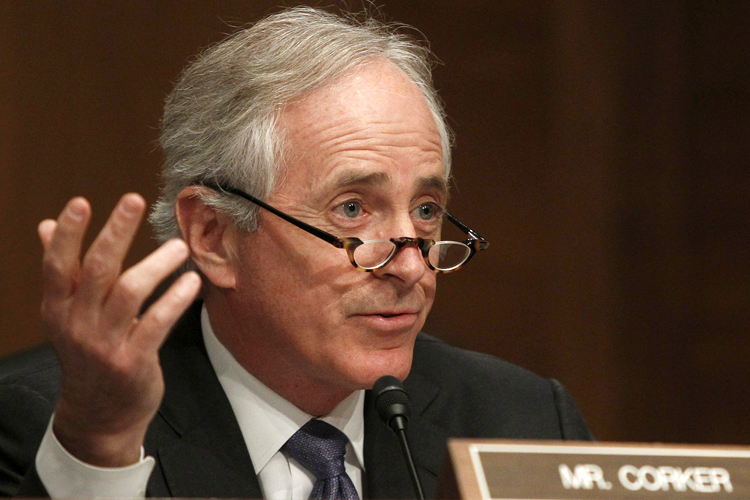Right-wing efforts to avert a precedent-setting union victory escalated dramatically Wednesday and Thursday, with U.S. Sen. Bob Corker, R- Tenn., announcing that if Chattanooga Volkswagen workers voted down unionization, the company would bring more business to their plant.
“I’ve had conversations today and based on those am assured that should the workers vote against the UAW, Volkswagen will announce in the coming weeks that it will manufacture its new mid-size SUV here in Chattanooga,” Corker said in a statement following the first of three days of voting by VW employees on whether to become the company’s first unionized workers in the United States.
Corker’s statement, titled “Corker: Conversations Today Indicate a Vote Against UAW Is a Vote for SUV Production,” noted that when Corker was mayor of Chattanooga in the early 2000s, “Much of the negotiation that led to Volkswagen choosing Chattanooga occurred around the dining room table of Corker’s Chattanooga home.” Asked whether, as the statement would appear to imply, Corker was suggesting that a vote to join the United Auto Workers would hurt the Chattanooga workers’ chances of securing the new SUV, a Corker spokesperson declined to comment further.
In a contrasting statement issued after Corker’s, Volkswagen CEO Frank Fischer said, “There is no connection between our Chattanooga employees’ decision about whether to be represented by a union and the decision where to build a new product for the U.S. market.” Corker shot back at the automaker Thursday, saying in an emailed statement that VW expansion decisions “are not being made by anyone in management at the Chattanooga plant” and that “Fischer is having to use old talking points when he responds to press inquiries.” Corker added that he “would not have made the statement I made yesterday without being confident it was true and factual.”
As I’ve reported, the VW vote has far-reaching implications for the UAW’s ambitions to organize the overwhelmingly non-union ranks of U.S. employees of foreign automakers, and for organized labor’s efforts to go on offense and organize the South. “We’ve said that when workers have a free, open choice, they’ll choose union representation every time,” UAW International president Bob King told Salon last week. “And I think VW Chattanooga will prove that.”
Following pressure from the UAW and the German VW workers’ union IG Metall, Volkswagen has maintained a stance of official neutrality on the union vote, publicly eschewing the anti-union campaigning that is commonplace in U.S. union drives. (Union members abroad have also lent support to U.S. organizing campaigns at companies including Wal-Mart, Ikea and the Australian logistics giant Toll Group.) Both UAW and VW have expressed support for pairing traditional collective bargaining with a German-style works council, in which elected employees offer input in company governance – a model King told Salon would yield “a lot more ownership in the success of the company.”
But while VW management has emphasized its neutrality toward the union, key conservatives haven’t. The Center for Worker Freedom — a project of Grover Norquist’s Americans for Tax Reform, directed by the co-author of an anti-union Op-Ed calling on Chattanoogans to follow the example of Confederate soldiers – has mounted billboards urging a “no” vote. Tennessee Republicans have suggested that unionization could cost VW its tax breaks: State Sen. Bo Watson told the Detroit Free Press that if workers went union, “then I believe additional incentives for expansion will have a very tough time passing the Tennessee Senate”; Gov. Bill Haslam told the Tennessean that “if UAW comes, we won’t be as effective in helping you build that supplier network.” And Corker, after saying in September that “to invite the UAW in is almost beyond belief,” then last week that it would not be “appropriate for me to make additional public comments,” is doubling down on the claim a vote against the UAW would be followed by expansion in Chattanooga.
Though apparently unauthorized by VW Chattanooga management, Corker’s comments illustrate how, in an era of globalization, capital mobility offers a powerful cudgel against workers’ organizing efforts. Fifty-seven percent of government-supervised union elections are marked by threats from management that a plant could shut down, according to research from Cornell’s Kate Bronfenbrenner. The implication “that we’ll have to ship this work somewhere else” helped defeat the International Association of Machinists and Aerospace Workers in a landmark 21-6 vote at an Amazon warehouse last month, according to a union spokesperson.
And the National Labor Relations Board ignited a political firestorm by investigating the aerospace giant Boeing for citing workers’ repeated strikes as a reason to move production elsewhere. Although it’s illegal to retaliate against workers for mounting legally protected strikes, those charges were withdrawn when Boeing reached a contract settlement with the IAM in 2011. Faced with the specter of another line of aircraft being produced elsewhere, Puget Sound Boeing workers narrowly approved major concessions last month.
Under U.S. labor law, it’s generally legal for management to “predict” negative consequences from unionization, but not to “threaten” them. In extreme cases, comments by third parties could also be found to have ruined the “laboratory conditions” required for a fair election; Indiana University professor Kenneth Dau-Schmidt told Reuters that Corker’s statements “would be grounds to set the election aside and have to run it all over again at a later date.”
Nonetheless, Wednesday and Thursday statements, the UAW maintained optimism about Friday night’s vote count. “Senator Corker’s comments directly contradict statements made by Volkswagen …” said UAW regional director Gary Casteel. “Who better knows about product placement than Volkswagen?”

